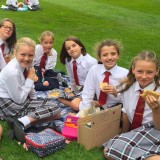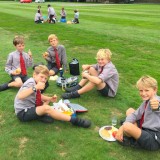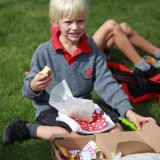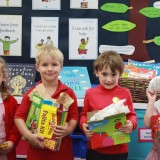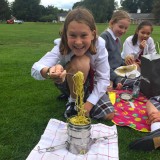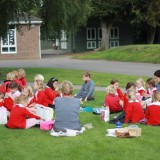At Westbourne House, we hope to encourage the coming generations to think about their impact on the environment in a new way. The school's green initiatives are designed to enable children to see there is an alternative and sustainable approach to life.
We hosted a plastic-free picnic for children from Reception, aged 4, to Year 6, aged 11. It was the brainchild of the Pre-Prep's Eco Committee, which is made up of children from Reception and Years 1 and 2. The committee has been looking at what they can do to encourage others to be more environmentally friendly. With support from Chris Porter, a Waste Prevention Advisor and educational visitor for West Sussex, the children decided to host a plastic-free picnic to encourage everyone to think about single use plastics and the environmental impact of what we use and choose.
The children were really excited by the plastic-free challenge and it was clear that a lot of thought and discussion had gone into their picnic choices. They reported that they had been surprised at how many food items they normally buy are wrapped in single use plastic, and for the picnic they came up with creative and novel ideas such as paper packages tied up with string, reused packaging, and home-made beeswax wraps. The children were vocal about their good choices. Certainly, the children are enthused and Westbourne House plans to build on this energy over the coming terms as it works towards its Bronze Eco School status.
In the Prep School, Years 3 and 4 have adopted an environmental focus, which is being highlighted in assemblies. Eager to get started on their eco tasks, the children went to West Wittering to clean up the beach. With the help of National Trust volunteers, the children sifted through sand and found all sorts of plastics and other rubbish.
In their first eco-assembly, there was a buzz as the children were given their copy of ‘100 Eco Things To Do Before I’m nine and three-quarters’ by Year 3 teacher Mrs Anderson. Many children found there were already a few eco challenges they could tick off, plus they were given a scrap book so they can add in photos, drawings and information about how they are working towards a more sustainable life. For every 10 eco achievements in the book, they will be awarded a certificate. It is designed to be open ended so that children can suggest and add their own green activities.
The idea behind our initiatives is to encourage our children to develop good habits now that will last for life. We can empower our children to create the world they want to live in by equipping them with skills, developing passions and encouraging creativity. We want them to understand that they can have an impact and influence as individuals, even at this young age.
Hester Anderson
If you would like to know more about plastic pollution, BBC's Downing in Plastic, which was aired recently, is available on the BBC iPlayer.




